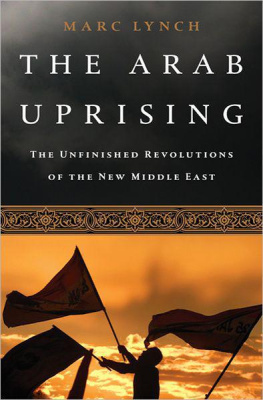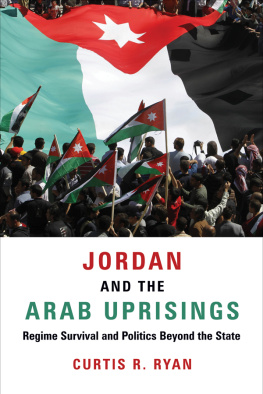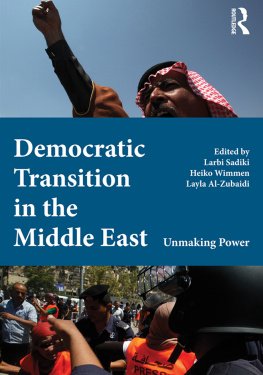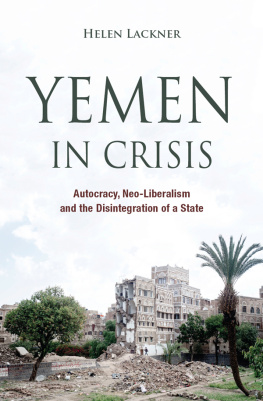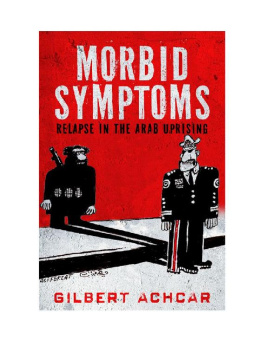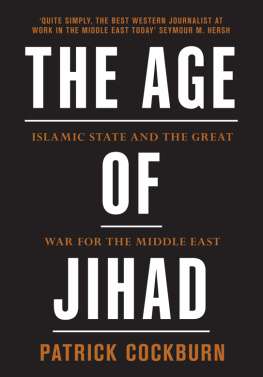

Copyright 2016 by Marc Lynch
Published in the United States by PublicAffairs, a Member of the Perseus Books Group
All rights reserved.
Printed in the United States of America.
No part of this book may be reproduced in any manner whatsoever without written permission except in the case of brief quotations embodied in critical articles and reviews. For information, address PublicAffairs, 250 West 57th Street, 15th Floor, New York, NY 10107.
PublicAffairs books are available at special discounts for bulk purchases in the U.S. by corporations, institutions, and other organizations. For more information, please contact the Special Markets Department at the Perseus Books Group, 2300 Chestnut Street, Suite 200, Philadelphia, PA 19103, call (800) 810-4145, ext. 5000, or e-mail .
Library of Congress Control Number: 2016931932
ISBN 978-1-61039-610-3 (EB First Edition)
10 9 8 7 6 5 4 3 2 1
For Sophia Faith and Alexander Reyes
Table of Contents
Guide
Contents
We are coming tonight. There wont be any mercy, warned Libyas Moammar Qaddafi on March 17, 2011, as his troops pushed relentlessly towards Benghazi, the beleaguered base of the month-old rebellion. As Qaddafis forces advanced, rebel leaders appealed desperately for the international community to intervene to protect them. The coming catastrophe unfolded on live television in the midst of a regionwide tidal wave of popular protest and furious regime crackdowns. The streets were watching, and the fate of the Arab uprisings seemed to hang in the balance.
The worlds response was extraordinary. The usually divided Arab League spoke with a single voice, calling for international action against Qaddafi. The United Nations Security Council, against all odds, passed a resolution authorizing military action to protect the Libyan rebels. NATO jets began bombing almost immediately, halting the regime forces and soon driving them back.
The airstrikes did not lead to a rapid victory, however. Six months of long, difficult stalemate followed, until a sudden rebel move into Tripoli overthrew Qaddafis regime. On October 20, Qaddafi himself was killed by rebels in Sirte. The National Transitional Council, the political leadership of the uprising that took control as the new Libyan government, announced an ambitious road map for a transition to a democratic Libya. By the spring of 2012, Libya seemed to vindicate the hopes of the Arab uprisings, the American strategy of limited military intervention, and a better Middle East.
But then, it all went wrong. The new Libyan state struggled to establish security, find political consensus, or build effective institutions despite holding democratic elections. The armed groups that had fought for the revolution refused to disarm, evolving into militias that controlled the streets. On September 11, 2012, the Islamist militia Ansar al-Sharia Libya launched a brazen military attack on the US consulate and CIA station in Benghazi. Only a month earlier, US Senators John McCain, Lindsey Graham, and Joe Lieberman had pushed for an American intervention in Syria by pointing to Libya, where profound gratitude for Americas help in the war against Moammar Qaddafi has laid the foundation for a bright new chapter in relations between our two countries. The killing of US Ambassador Chris Stephens and two others in the heartland of the Libyan revolution by a jihadist militia amidst chaotic anti-American protests put a cruel face on that new chapter. For many, it offered a disheartening epitaph for the Arab uprisings themselves.
In the aftermath of the Benghazi attack, Libyan politics and society polarized dangerously, while jihadist groups took advantage of the security vacuum to rebuild themselves. In Washington, the smoldering ruins of Benghazis consulate turned Libya overnight from a tentative sign of a hopeful future into a blisteringly partisan nightmare. As America recoiled in horror and militia violence rapidly spread, the Libyan state rapidly crumbled. Oil production and the rest of the economy collapsed. The government recognized by the international community controlled only one part of the country, while a rival government dominated the rest. The country degenerated into a civil war between two heavily armed coalitions, each receiving significant financial and military support from external powers. Jihadists established new strongholds in the fractured terrain.
The Obama administrations decision to join with NATO and its Arab allies to intervene militarily in Libya stands today as a crucial turning point in the Arab uprisingsone with effects far beyond that countrys borders. The lessons of that intervention remain deeply contested. The intervention succeeded in its short-term goal of protecting Libyan civilians by preventing a near-certain massacre, and helped to remove one of the nastier of the Arab dictators. Had Obama not acted, America would certainly have been blamed for allowing the uprising to end in bloodshed. But acting, in turn, caused a whole set of other unintended problematic outcomes. Some now argue that the real problem was not the intervention but rather Americas failure to provide for post-war stabilization. But Libyas new political leaders had firmly rejected any such international peacekeeping force. Even had they not, the dark history of the occupation of Iraq ensured no such forces were forthcoming... and suggests that it would not have helped.
Why begin this story with Libya, rather than with the crisis in Syria or the challenge of the Islamic State? Because Libya was a decisive turning point in the transformation of the Arab uprisings from domestic peaceful uprisings into a regional proxy war. Libyas war offered the first violently cautionary tale against seeking democratic change after the dizzying success of protest movements in Tunisia and Egypt. The NATO intervention showed Arab protestors and autocrats alike that armed insurrection could succeed by attracting external assistance. It showed Arab powers that they could convince the West to back their ambitions with military might, but led Russia to block further such United Nations resolutions. Its subsequent collapse into civil war then became an object lesson in the dangers of intervention and state failure. Libya in many ways set the stage for Syrias descent into catastrophic civil war.
Libyas failed promise is personal to me. When these events were unfolding, I was writing as a columnist for Foreign Policy, meeting regularly with Obama administration officials, and appearing frequently in the media. I argued for the US to intervene to support the Libyan protestors, both to protect civilians from extreme state violence and to sustain the momentum of the Arab uprisings by deterring armed repression of protestors elsewhere. Libya was the first American war since Bosnia that I supported. That this intervention failed led me to publicly rethink many of the arguments for American intervention in the Middle East. It baffles me that the lesson which most of Washington learned from the tribulations of the Libya intervention was that Obama should also have intervened in Syria.
I began writing this book in part to continue rethinking the assumptions and arguments that shaped my initial analysis of not only Libya but also of the broader Arab uprising. I hope that it encourages others to do the same. Political scientists, journalists, and participants in the momentous events of the last five years have produced an enormous amount of real-time analysis. Much of it has been absolutely first-rate, and I draw heavily in this book on the collective scholarship of hundreds of thoughtful, deeply informed, and brilliantly analytical individuals. What, in the heat of the fray, did we tend to underestimate or exaggerate? What problems did we miss, or fail to propose adequate solutions for what we correctly diagnose?


